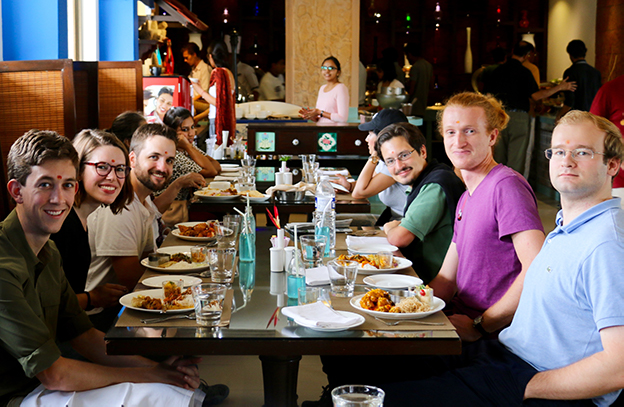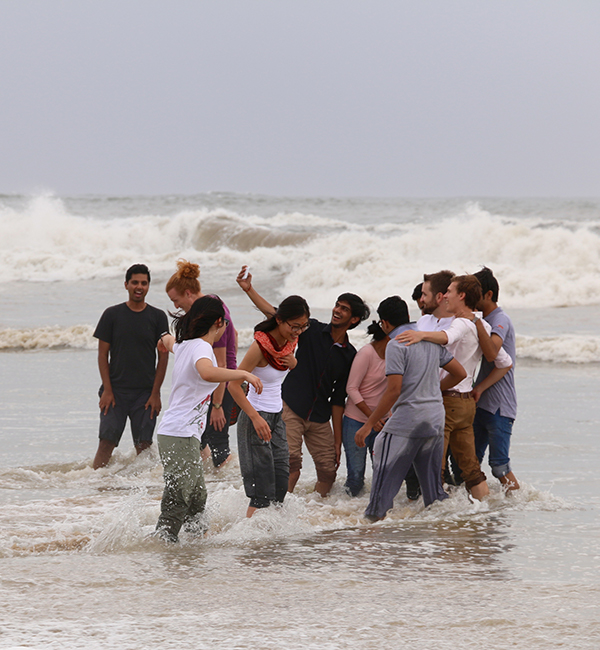The Tata Center supports the work of MIT faculty and graduate students whose research aligns with the Center’s mission. Numerous disciplines, including mechanical engineering, civil & environmental engineering, architecture, business administration, urban planning, and more, are represented in the Center’s diverse population.
Tata Fellows are chosen by MIT faculty from graduate students (Masters or Doctoral students) in their departments or related departments and with an interest in their Tata research project. The Tata Fellows have the opportunity to be educated and immersed in the context of India and other developing countries while completing their graduate studies and doing work with real-world application. In many cases, they collaborate on projects in interdisciplinary and international teams. The Tata Fellowship is awarded typically for two years but can be extended for an additional year if the project is progressing and needs additional time for completion.
Candidates for Fellowships must have strong technical backgrounds with an interest in design, entrepreneurship, and developing countries, and must be admitted to, or currently enrolled in, eligible MIT graduate level degree programs. Fellows are expected to spend six weeks in the Summer period and at least two weeks during the Independent Activities Period in India or other developing country, invested in problem-finding and design activities.

MIT faculty can apply to the annual Request for Proposals (RFP) posted annually on our website. We seek projects that will apply technology and systems innovations to challenges in India and the developing world, with the goal of having a significant positive impact on quality-of-life and sustainable development. The call is open to MIT Principal Investigators only.
Each winter the Tata Center issues a call for Research Funding Proposals, at which time MIT faculty members can submit their project proposals. When a proposal is accepted, Tata Fellows are then nominated by their Faculty P.I.s. If you are a current or prospective MIT graduate student interested in joining the Tata Center program, discuss it with your P.I. We are also happy to provide you with more information. Contact us by email.
The Undergraduate Research Opportunities Program (UROP) cultivates and supports research partnerships between MIT undergraduates and faculty. One of the leading programs of its kind in the United States, MIT’s UROP invites undergraduates to participate in research as junior colleagues. As UROPs, undergraduates participate in each phase of standard research activity: developing research plans, writing proposals, conducting research, analyzing data and presenting research results in oral and written form.
MIT students use their UROP experiences to become familiar with the faculty, learn about potential majors, and investigate areas of interest. UROPs gain knowledge and practical skills that are applicable to careers after graduation or as graduate students. Most importantly, they become involved in exciting research. If you are an MIT undergraduate student interested in working on a Tata Center project, please contact a faculty member who currently has Tata funding in your department or related department to find out more about whether there is an opportunity to work with a Tata Fellow on his/her project. More about MIT UROPs
The Tata Center supports 10 Tata Summer Interns in the MISTI-India Research Internships in Science and Engineering.
This is a unique opportunity for MIT undergraduate students to explore the Indian science and technology milieu, gain practical skills, and develop collaborative networks.
Internships take place in national laboratories, federal research centers, academic research institutes, and private R & D laboratories in India, and are a source of mutual cultural and professional enrichment for both the interns and their host institutions.

Understanding Emerging Communities
This seminar is designed to expose students to conceptual frameworks and case studies that, collectively, provide a holistic understanding of the challenges to designing and implementing technology, policy, and systems-based solutions for severely resource-constrained communities.
The course focuses on key challenges faced by engineers, managers, and policymakers in corporations, NGOs, and Governments, and is designed to equip students with a broad toolkit of perspectives and methodologies for problem-solving.
The seminar is designed to serve as a vehicle for making progress on research and implementation of student projects. An important objective of the course is to foster a community of like-minded professionals.
This seminar is the first course in a fall/spring sequence and is a required course for the Fellows of the Tata Center for Technology and Design. It is also open to anyone else at MIT with instructor’s permission.
Operating in Emerging Communities
This seminar, designed primarily for graduate students working on solutions for resource-constrained communities, is a sequel to the Fall seminar. Complementary to the upstream focus of the fall semester, this course focuses on the downstream issues surrounding the adoption, distribution, and scaling of new solutions via business, non-profit, or public policy mechanisms in an international development context.
The course focuses on developing key components underpinning business or policy implementation of a solution such as market or beneficiary segments, a clear value proposition, and unit economics or cost-benefit analysis. To do so, students develop Techno Economic Models to articulate the impact of their proposed interventions, and analyze the uncertainties surrounding their proposal.
The course also focuses on communicating proposed interventions in various settings, including as an elevator pitch, a business plan, or a policy brief.
This seminar is the second course in a fall/spring sequence and is a required course for the Fellows of the Tata Center for Technology and Design.
The Society of Tata Fellows is a global community of scholars, engineers, and entrepreneurs emerging from the Tata Center for Technology and Design at MIT. All members of the Society have completed a Tata Fellowship, either as a graduate student or postdoctoral associate, and while their talents, interests, and accomplishments span many fields, each has made a meaningful and lasting contribution to the Tata Center’s mission. The Society is dedicated to their continuing success and collegiality.


